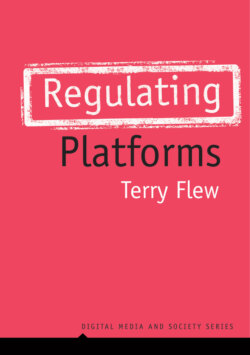Читать книгу Regulating Platforms - Terry Flew - Страница 23
Platformization of the Internet
ОглавлениеOne of the major debates of our time is around the extent to which digital platforms have transformed contemporary economies and societies. Concepts such as ‘surveillance capitalism’ (Zuboff, 2019) and ‘platform capitalism’ (Srnicek, 2017) point to a shift within the digital economy from the age of the open internet. In her account of the rise of surveillance capitalism, Shoshana Zuboff locates the shift in 2001 and in Google’s efforts, in response to the dot.com crash, to reuse search data so as to better ‘train’ its algorithms, and hence to develop more precisely targeted online advertising offerings (Zuboff, 2019). The rise of platforms is generally taken to mark the end of the open internet. The open internet may have been a conceptual ideal more than an empirical reality, but it captured a broad ideology, summarized by Eli Noam as being ‘based on a common set of values, a non-profit sharing ideology, and a libertarian philosophy of minimal government. The decision process was one of rough consensus. This mechanism was so successful that it enabled the emergence of the key communications system around the world’ (Noam, 2016, p. 559).
It can now be said that we are living in an age of platformized internet, where the overwhelming bulk of communication activity that occurs online is mediated through a relatively small number of digital platforms. As Tarleton Gillespie has observed, the users’ turn to platforms involved expedited access to digital content as a commodity, as it offered ‘a better experience of all this information and sociality: curated, organised, archived and moderated’ (Gillespie, 2018a, p. 14). We can now see the critical role played by successful digital platforms in curating the open web and enabling participation and engagement at scale among ever-growing sections of the global population (Helmond, 2015). Julie Cohen concluded that while, ‘in theory, the twenty-first century communications infrastructure still known as the Internet is “open” … for most practical purposes … the “network of networks” is becoming a network of platforms; Internet access and use are intermediated from beginning to end’ (Cohen, 2017, p. 143).
The implications of this platformization are deep and pervasive and have fundamentally changed the internet’s ‘open’ form, which animated discussion in the 1990s. One important consequence is that platformization has cemented an ongoing relationship, frequently fraught, between digital platforms and the traditional mass media, as the latter provide a significant amount of content for the former; and this in turn enables media companies to reach new audiences where both are direct competitors for the same advertising revenues.
Another important implication, which has paradoxical consequences, is that the platformized internet is more able to be regulated by governments than the open web, as internal governance is a core defining feature of digital platforms (Parker et al., 2016). As a result, the push for renewed forms of external regulation comes at a time when it is no longer possible to say that regulation is inherently doomed to fail, since the platforms are clearly subject to forms of governance regulated according to the principles of accountability and transparency, even if the precise mechanisms through which that would occur remain very much open to debate.
Internet communication is thus increasingly dependent upon private communications platforms, so governments’ laissez-faire approaches to speech have produced a public sphere that is increasingly governed by a small number of private corporations. Authors such as Napoli (2019b), Balkin (2018), and Langvardt (2019) have argued that this new layer in the governance structure turns traditional debates about free speech on their head, as the largest digital communication platforms now have a variety of powers over speech. These powers include the power of content moderation, the power to regulate the structure of media markets through control over the terms of content distribution, and the power to manage cultural flows by promotion or suppressing particular forms of expression.
